Lots of damage for such a minimal net spending reduction.
www.nytimes.com/2025/06/09/o...
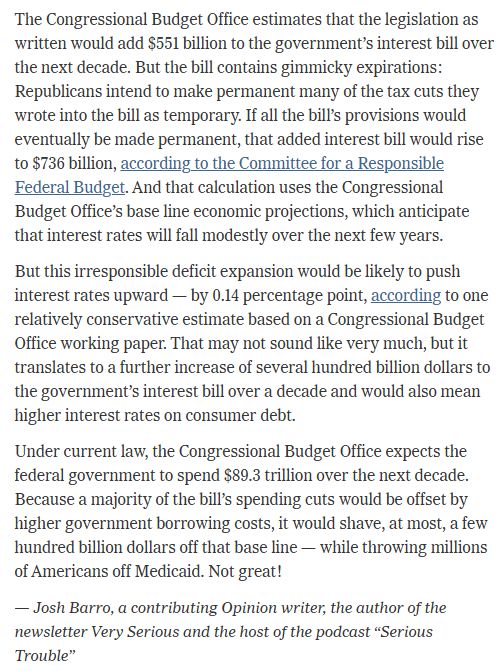
Lots of damage for such a minimal net spending reduction.
www.nytimes.com/2025/06/09/o...
Excellent op-ed today describing some of the on-the-ground challenges: www.nytimes.com/2025/06/08/o...
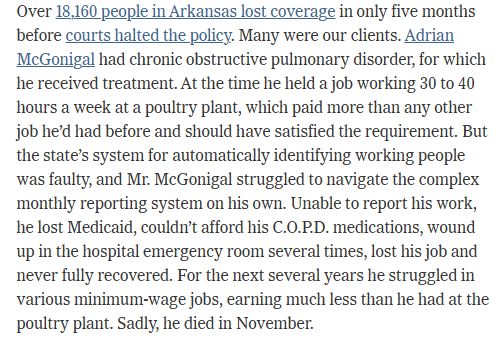
Excellent op-ed today describing some of the on-the-ground challenges: www.nytimes.com/2025/06/08/o...
No more coverage lifeline for people between jobs.
That's what prior attempts with Medicaid work requirements have delivered, all without even increasing employment.
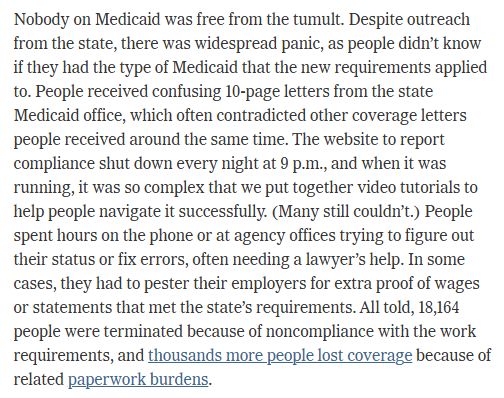
No more coverage lifeline for people between jobs.
That's what prior attempts with Medicaid work requirements have delivered, all without even increasing employment.
www.brookings.edu/articles/new...
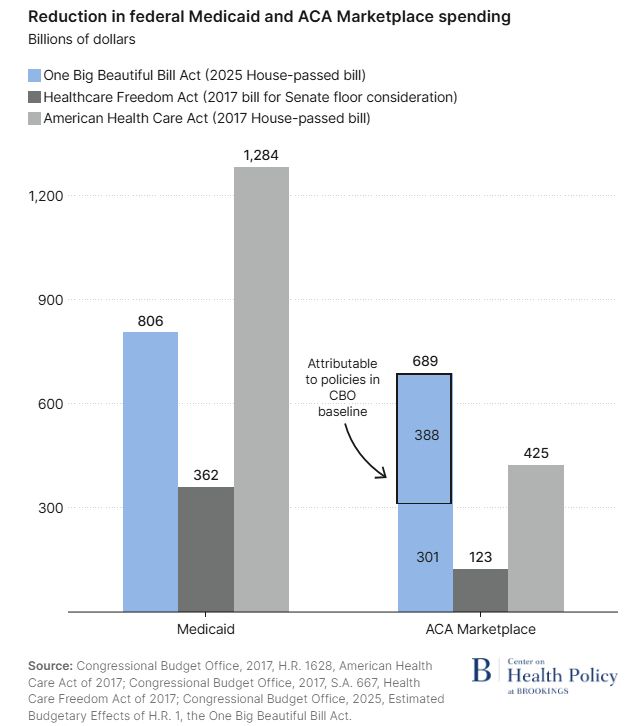
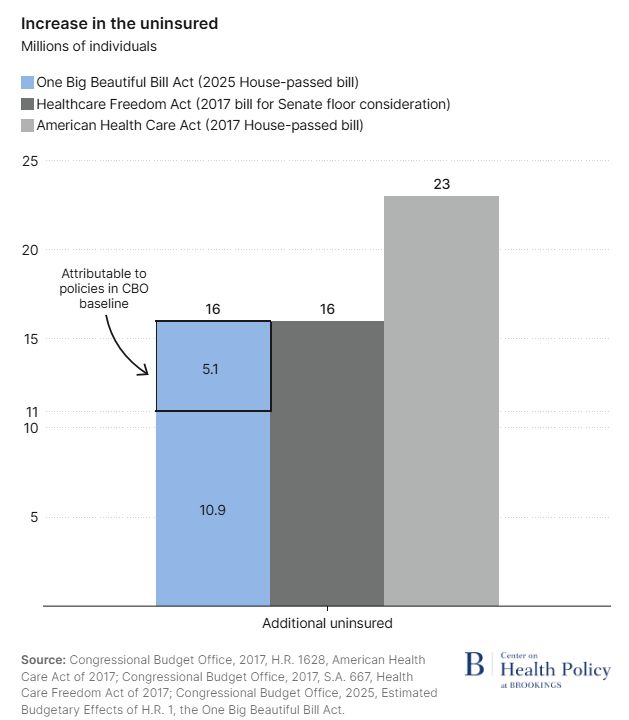
www.brookings.edu/articles/new...
• 11.8 million lose coverage due to One Big Beautiful Bill provisions
• 16M fewer w/ coverage in 2034 when incorporating the 4.2M expected coverage loss from expiration of enhanced ACA subsidies
That's a 57% ↑ in # of uninsured compared to June 2024 current policy projection
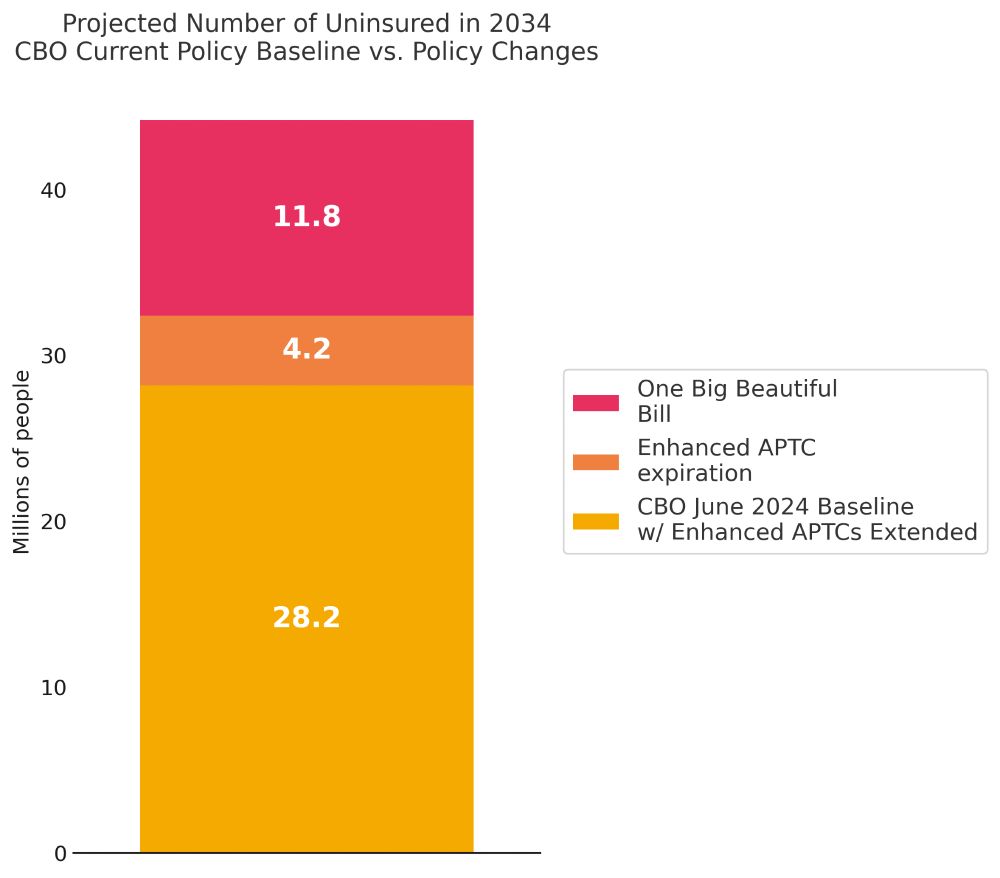
• 11.8 million lose coverage due to One Big Beautiful Bill provisions
• 16M fewer w/ coverage in 2034 when incorporating the 4.2M expected coverage loss from expiration of enhanced ACA subsidies
That's a 57% ↑ in # of uninsured compared to June 2024 current policy projection
Here's one alternative path: www.healthaffairs.org/content/fore...
From a fiscal perspective, even better would be to ditch the bill's net tax cuts that will add trillions to our debt.
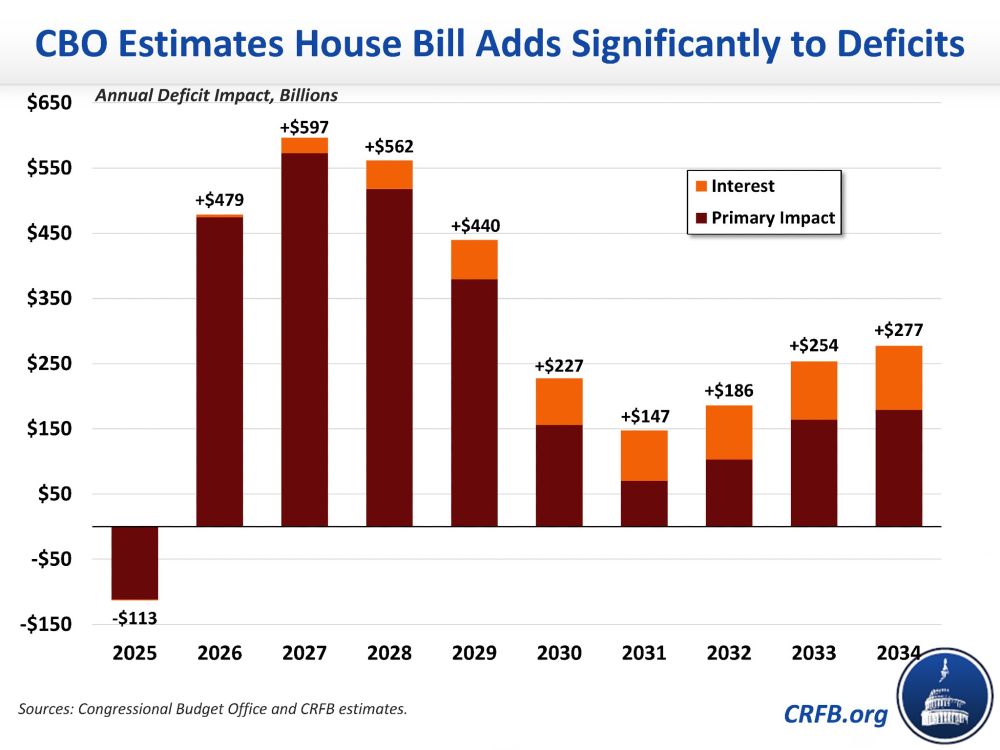
Here's one alternative path: www.healthaffairs.org/content/fore...
From a fiscal perspective, even better would be to ditch the bill's net tax cuts that will add trillions to our debt.
Instead, they singled out people w/ the lowest incomes for the lion's share of cuts.
Then re-directed that $$ mainly for more high-income tax cuts.
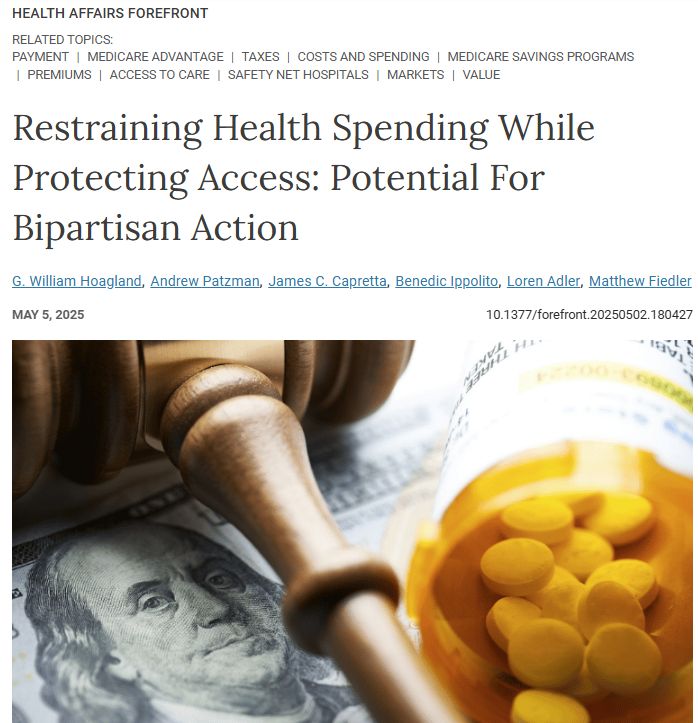
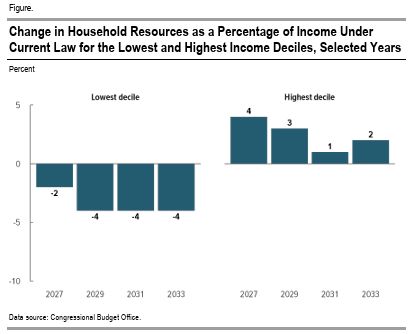
Instead, they singled out people w/ the lowest incomes for the lion's share of cuts.
Then re-directed that $$ mainly for more high-income tax cuts.
>10 million more uninsured
>1 million low-income seniors see higher Medicare premiums & cost-sharing
Large ACA premium ↑
~ 30% cuts to SNAP
~ $3 trillion in new debt
Makes low-income households worse off & high-income households better off.


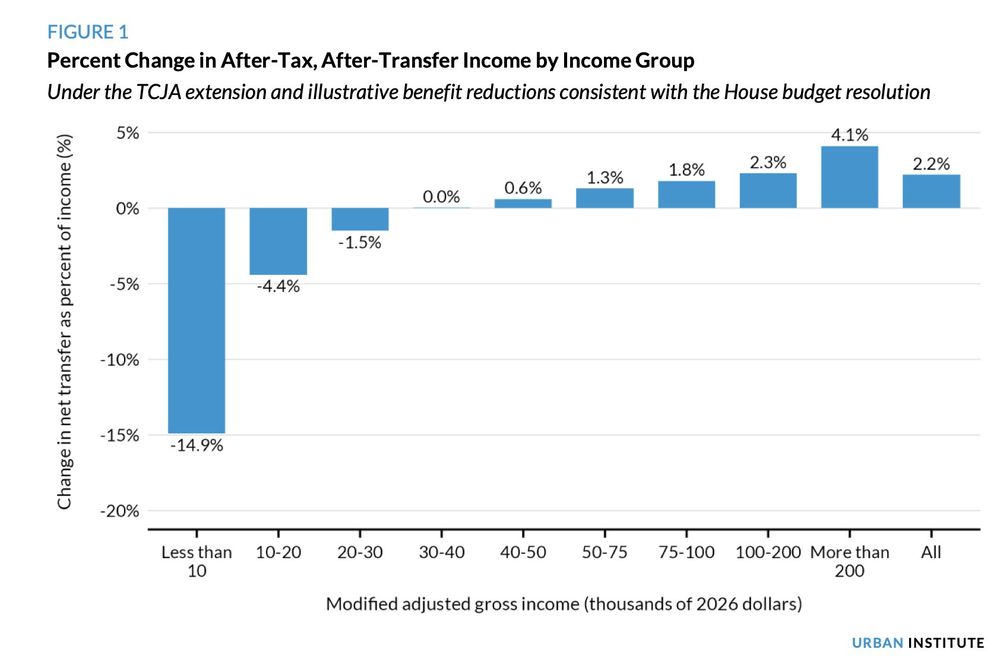
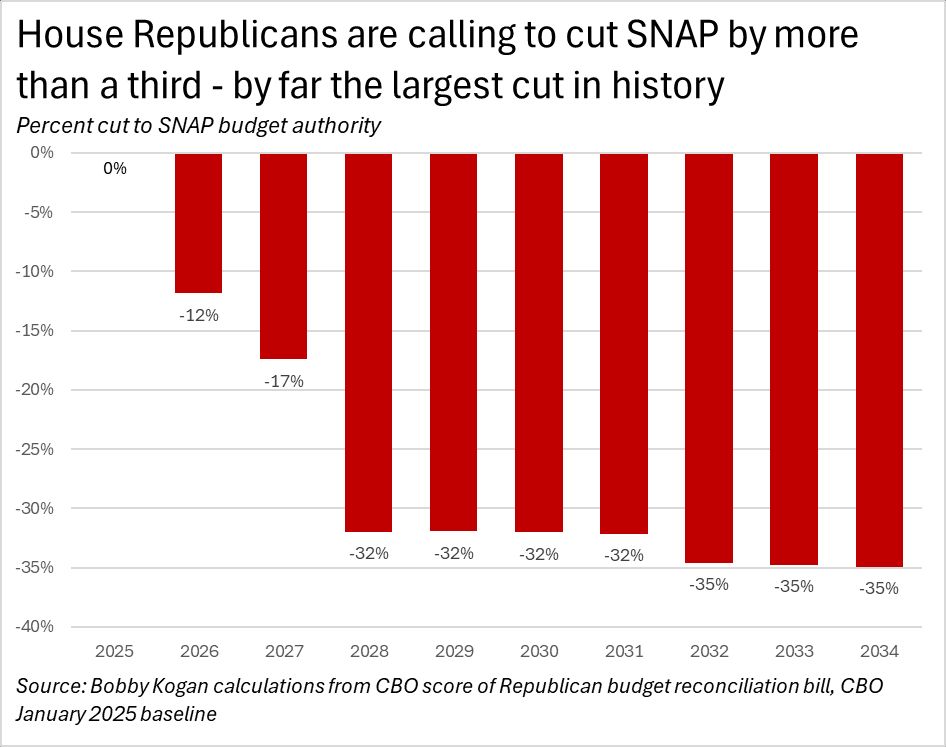
>10 million more uninsured
>1 million low-income seniors see higher Medicare premiums & cost-sharing
Large ACA premium ↑
~ 30% cuts to SNAP
~ $3 trillion in new debt
Makes low-income households worse off & high-income households better off.
Effects likely small either way, particularly at current levels of payer/PBM integration.
www.brookings.edu/articles/a-b...

Effects likely small either way, particularly at current levels of payer/PBM integration.
www.brookings.edu/articles/a-b...
No Medicare site-neutral reforms, likely the most impactful cost containment provision debated.
Billing transparency for hospital depts should help a little at the margin.
Employer-facing PBM transparency provision could help reduce costs slightly.


No Medicare site-neutral reforms, likely the most impactful cost containment provision debated.
Billing transparency for hospital depts should help a little at the margin.
Employer-facing PBM transparency provision could help reduce costs slightly.

Could easily use some savings from reducing MA plan overpayments to avoid the cost-sharing increases before the new OOP cap in this option.

Could easily use some savings from reducing MA plan overpayments to avoid the cost-sharing increases before the new OOP cap in this option.
Just look at all that $$ on the table if we paid Medicare Advantage plans closer to what the law intended.
www.cbo.gov/system/files...


Just look at all that $$ on the table if we paid Medicare Advantage plans closer to what the law intended.
www.cbo.gov/system/files...
Given there's an in-network contract, there's likely no option to bill the patient for the denied claim (though this could depend on specific contract language).

Given there's an in-network contract, there's likely no option to bill the patient for the denied claim (though this could depend on specific contract language).
Quick(ish) 🧵

Quick(ish) 🧵
phg.tbe.taleo.net/phg03/ats/ca...

phg.tbe.taleo.net/phg03/ats/ca...
So far the prices emerging from IDR have been very high relative to pre-law prices, but how much can we extrapolate?
For EM, we find that nearly half the claims disputed in 2023 were between United & TeamHealth.

So far the prices emerging from IDR have been very high relative to pre-law prices, but how much can we extrapolate?
For EM, we find that nearly half the claims disputed in 2023 were between United & TeamHealth.
We find some surprisingly low QPAS, including 6.3% below the Medicare price. The averages also look lower than expected, though unclear how much is a selection effect vs. shenanigans or other reasons.
For longer discussion: www.brookings.edu/articles/out...


We find some surprisingly low QPAS, including 6.3% below the Medicare price. The averages also look lower than expected, though unclear how much is a selection effect vs. shenanigans or other reasons.
For longer discussion: www.brookings.edu/articles/out...
The No Surprises Act has been especially generous to large, PE-backed groups, who brought 92% of the EM disputes
PE-backed groups are winning 90% of time vs just 39% for other groups, generating an average IDR payment 63% higher relative to the QPA than non-PE groups.

The No Surprises Act has been especially generous to large, PE-backed groups, who brought 92% of the EM disputes
PE-backed groups are winning 90% of time vs just 39% for other groups, generating an average IDR payment 63% higher relative to the QPA than non-PE groups.
Importantly, the prices emerging from IDR are also far higher than independent estimates of pre-law median in-network prices:
www.brookings.edu/articles/out...

Importantly, the prices emerging from IDR are also far higher than independent estimates of pre-law median in-network prices:
www.brookings.edu/articles/out...
1) Prices emerging from the independent dispute resolution (IDR) process are far higher (2.65x) than insurer-calculated 2019 median in-network rates (qualifying payment amount, QPA)

1) Prices emerging from the independent dispute resolution (IDR) process are far higher (2.65x) than insurer-calculated 2019 median in-network rates (qualifying payment amount, QPA)
Quick 🧵 w/ a few takeaways on who's using the process, how much better PE-backed groups are faring than competitors, & some surprisingly low QPAs.
academic.oup.com/healthaffair...

Quick 🧵 w/ a few takeaways on who's using the process, how much better PE-backed groups are faring than competitors, & some surprisingly low QPAs.
academic.oup.com/healthaffair...
There you can argue about overbilling, or alternatively beef up audits/checks: pmc.ncbi.nlm.nih.gov/articles/PMC...

There you can argue about overbilling, or alternatively beef up audits/checks: pmc.ncbi.nlm.nih.gov/articles/PMC...
After a couple days of tweets making the Anthem anesthesia policy sound either much more egregious or much more sanguine than it really was.

After a couple days of tweets making the Anthem anesthesia policy sound either much more egregious or much more sanguine than it really was.
www.cbo.gov/system/files...

www.cbo.gov/system/files...

